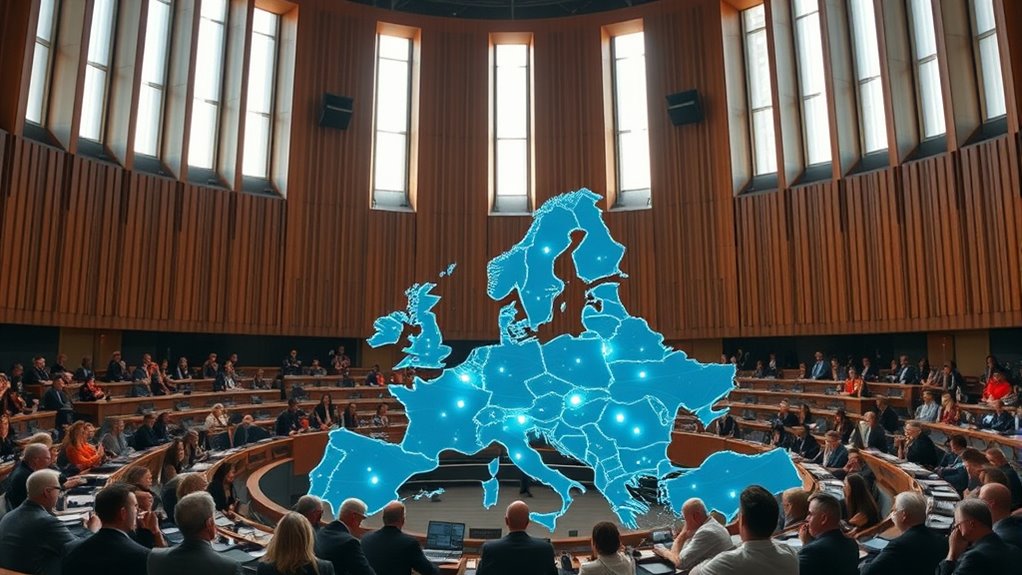The European Union is ramping up its AI efforts to reduce dependence on foreign tech giants by investing up to €200 billion through initiatives like InvestAI and public funding programs. They’re implementing the world’s first all-encompassing AI regulation, the AI Act, to promote responsible development and deployment. The EU is also building a self-reliant ecosystem with world-class infrastructure and advanced data policies. Keep exploring to discover how these steps are shaping Europe’s position as a global AI leader.
Key Takeaways
- The EU’s AI strategy aims to develop independent, world-class AI infrastructure and data ecosystems, reducing reliance on foreign tech giants.
- Investment initiatives like InvestAI and public funding are mobilizing up to €20 billion annually for local AI innovation.
- The comprehensive AI Act establishes a self-reliant legal framework to regulate and promote responsible AI development within Europe.
- Policies such as the Data Act and Data Governance Act facilitate access to high-quality data for domestic AI research and deployment.
- The EU’s focus on creating “AI factories” and sector-specific adoption aims to lead in responsible, independent AI deployment globally.

The European Union is accelerating its AI initiatives with an all-encompassing strategy aimed at making Europe a global leader in artificial intelligence. This bold push is outlined in the “AI Continent Action Plan,” introduced by the European Commission on April 9, 2025. It sets a clear strategic agenda to boost AI adoption and development within the EU, positioning Europe as a serious contender on the global stage. The plan’s core objectives focus on fostering excellence, establishing sector leadership, and ensuring AI benefits society and individuals alike. To achieve this, the plan is built around five pillars: computing infrastructure, data, skills, regulatory simplification, and sector-specific adoption.
Europe aims to lead global AI innovation through strategic investment, regulation, and infrastructure development.
You’ll see a significant financial commitment backing these efforts. The InvestAI facility aims to mobilize up to €200 billion for AI investments, demonstrating the EU’s firm resolve. Additionally, annual investments from Horizon Europe and Digital Europe programs reach €1 billion each, aiming for a combined €20 billion annually from public, private, and national sources. The Recovery and Resilience Facility allocates €134 billion for digital transformation, supporting AI growth. This funding supports both regulatory development and sector-specific innovation, ensuring a balanced approach that promotes innovation without sacrificing oversight. Part of this effort includes establishing “AI factories,” with full operations targeted by the end of 2025, to accelerate practical deployment.
Regulation is a central pillar of the strategy. The AI Act, enacted in 2024, is the world’s first all-inclusive legal framework on AI. It sets risk-based rules for developers, deployers, and providers, applying beyond Europe’s borders to any company offering AI accessible within the EU. The law categorizes AI risks into unacceptable, high, transparency, and minimal, each with specific obligations. To foster early compliance and stakeholder engagement, the Commission launched a voluntary AI Pact. These regulatory efforts aim to streamline rules and reduce barriers that could hinder innovation. The AI Act has already influenced global AI regulation efforts, setting a precedent for other regions to follow. Furthermore, the development of a comprehensive regulatory framework demonstrates Europe’s commitment to responsible AI innovation.
Building a robust infrastructure and data ecosystem is equally crucial. The plan emphasizes creating world-class computing resources and ensuring access to high-quality data through policies like the Data Act and Data Governance Act. The upcoming Data Union Strategy aims to facilitate cross-border data sharing and interoperability. These measures help move AI from research labs into practical, real-world applications across industries, empowering Europe to lessen dependence on foreign tech giants and establish a self-reliant AI ecosystem.
Frequently Asked Questions
How Will These Efforts Impact AI Innovation in Europe?
Your efforts to boost AI in Europe will likely lead to a more vibrant innovation ecosystem. With increased funding, you’ll see more startups and research initiatives thrive. The new regulatory framework encourages trustworthy, ethical AI development, fostering public trust. Strategic infrastructure projects and data ecosystems will improve collaboration and speed up deployment. Overall, your focus on investment, regulation, and infrastructure positions Europe to become a global leader in responsible AI innovation.
What Specific Technologies Will Be Prioritized by the EU?
You’ll see the EU prioritize advanced AI hardware, like the new “gigafactories” with over 100,000 processors, to boost sovereignty. Cloud infrastructure and high-quality data access will also take center stage, supported by investments and regulations ensuring trustworthy AI. Focused on sectors like critical infrastructure and healthcare, these technologies aim to keep Europe competitive, safe, and innovative—proving that with the right tools, you can change the game.
How Does This Initiative Compare to US and Chinese AI Strategies?
You’ll see that the EU’s AI strategy emphasizes regulation, trustworthy AI, and strategic investment, aiming for balanced growth. Unlike the US, which prioritizes innovation and market freedom, the EU enforces risk-based rules and legal frameworks. China’s approach is heavily state-led, focusing on rapid deployment and control. Your focus should be on understanding how these differing philosophies shape each region’s AI development and global influence.
Will There Be Increased Funding for European AI Startups?
Yes, there will be increased funding for European AI startups. You can access various grants like Horizon Europe, EIC Accelerator, and Digital Europe, which provide substantial financial support for innovative projects. Private investments are also rising, with major players like Nvidia and ASML investing heavily. These developments mean you’ll find more opportunities and resources to grow your AI startup within Europe, boosting your chances of success in the competitive AI landscape.
How Will Privacy and Data Security Be Maintained?
Imagine your personal data swimming in a guarded moat, with knights (regulators) watching over every splash. You’ll maintain privacy and security by following strict rules: limiting data use, obtaining clear consent, and allowing easy withdrawal. You’ll implement encryption, anonymization, and human oversight, ensuring AI systems respect your rights. Regularly review policies and stay compliant with regulations, so your data remains protected from prying eyes and rogue AI adventures.
Conclusion
As you watch the EU’s AI efforts grow, it’s clear they’re planting seeds to break free from foreign tech giants. This push isn’t just about keeping pace; it’s about forging a path where European innovation blooms independently. Just like a lighthouse guiding ships through dark waters, the EU’s determined steps aim to steer the future of AI toward local mastery and sovereignty, illuminating a new dawn where Europe leads rather than follows.










